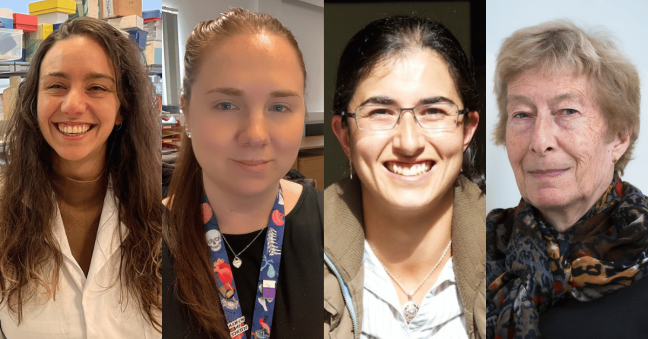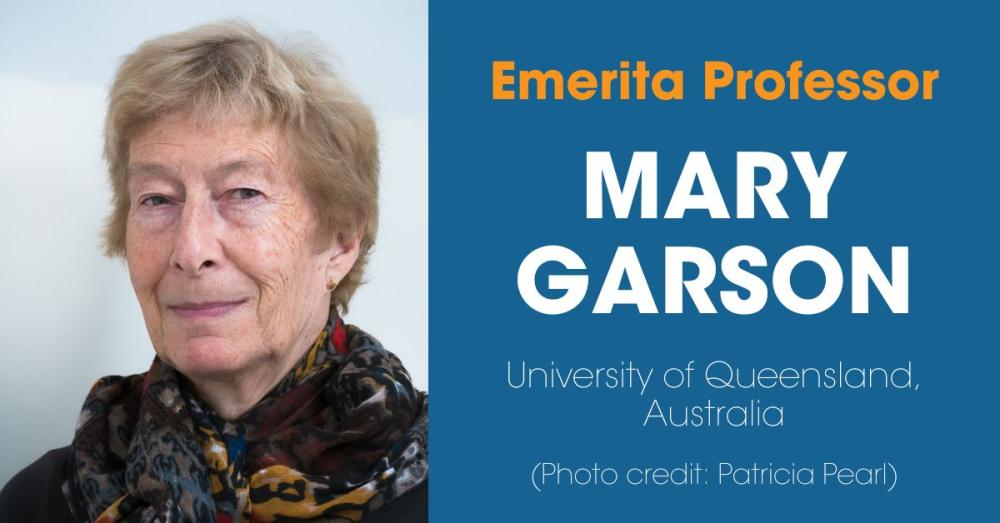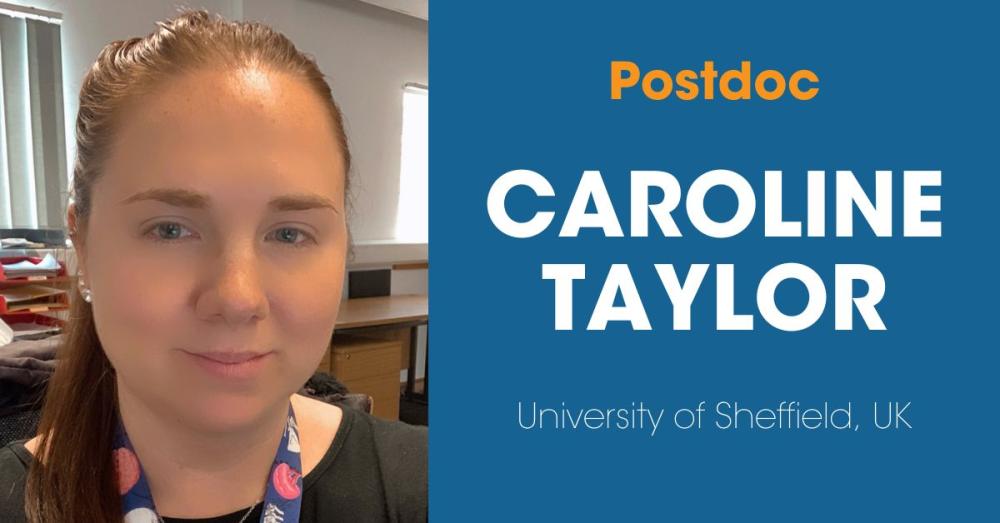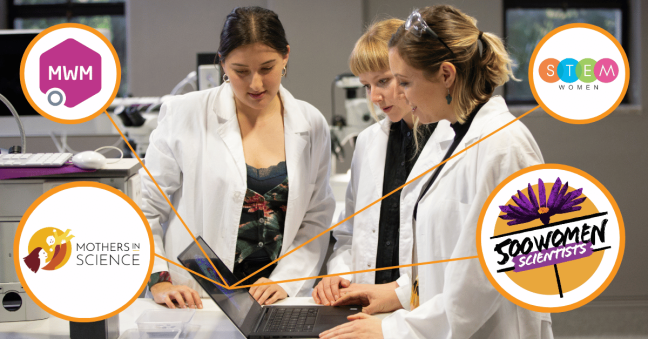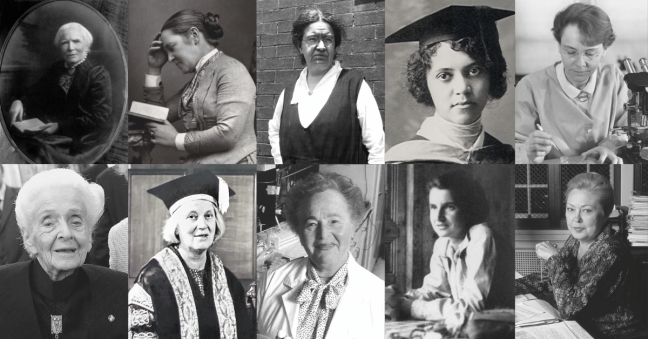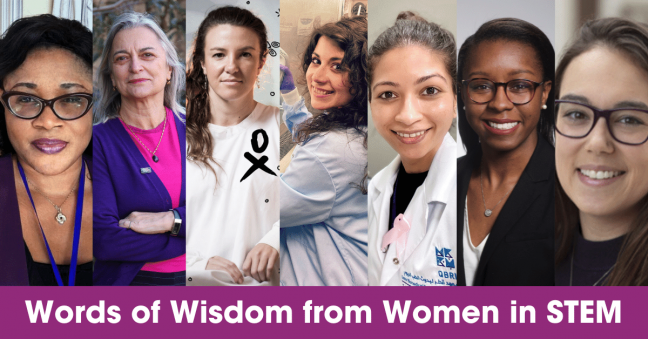Are Things Improving for Women in STEM?
It’s 2024, and women have come a long way in the world of STEM research. Over the decades, female scientists have faced challenges around gender bias, unequal pay, harassment, and poor representation at leadership level. Although some of these challenges still exist, the general feeling amongst many is that working conditions and career opportunities are slowly improving for women in STEM.
We spoke to four female scientists at different stages of their careers to ask them about their experiences, the challenges they have faced, how they see things changing, and their hopes for a more equal and inclusive future. Here are the fascinating and insightful thoughts of Emerita Professor Mary Garson, Professor Emma Robinson, postdoc Dr Caroline Taylor, and PhD student Elisa Corti on what it’s like to be a woman in STEM today.
Mary Garson is an Emerita Professor in Organic Chemistry at the University of Queensland, Australia. She graduated from the University of Cambridge in 1977 and was an Overseas Research Fellow of the Royal Society in Rome, Italy from 1977-1978. She has held academic roles at the James Cook University of North Queensland and the University of Wollongong, as well as working in the UK pharmaceutical industry for Smith Klein Beecham. In 1990 she joined the University of Queensland and was appointed to a professorship in 2006. Her research has explored the chemistry and natural bioactivity of secondary metabolites from both the marine and terrestrial environment, and has a marine flatworm, the Maritigrella marygarsonae, named in her honour after being the first to collect one during a field trip to Heron Island Research Station. (Photo credit: Patricia Pearl).
How has the representation of women in STEM changed during your time in science?
At Cambridge University I was one of five women in a final year class of close to one hundred, and I think I quite enjoyed being “different”- I had a wonderful social life! It was a residential university, and after a day in the lab, I went home to a strong community of women who valued knowledge and scholarship, so it was completely natural for me to view women as academics (even though very few women had formal lecturing roles within the university system at that time). Also, I was fortunate that my male PhD advisor was a gender champion before we ever knew that such people existed or indeed were needed; I am truly grateful to him for his calm steering of my early professional career. Consequently, I never really thought about gender or of ‘Women in STEM’ issues during the first years of my educational and academic career.
After I moved to Australia, I began to notice issues, and I joined WISENET back in 1986. That network has now disbanded, and there are much stronger formal networks for women researchers and academics with issues being much more transparent. The fundamental issues are unchanged; truly it’s very hard for any researcher/educator to make it into a full-time, permanent career given the difficult access to funding and the hideous ultracompetitiveness. In my view, women are still disproportionately affected, and not just because of the family/carer issue.
Have you encountered any instances of gender discrimination or bias during your career?
Yes, of course. The early phases of my career went very well, and I was fortunate to be well supported by both male and female senior academics. So it was a surprise to find myself marginalised when I moved (as the first female academic) into a large, well established university chemistry department, and to experience bias. The issue was that I did not fit the well established mould for academics in that department, both in research and in ideas. My research at the interface of organic chemistry and marine biology was not well considered and my colleagues were often dismissive of the level of scholarship involved. However there was one professor who was much more enlightened and outward-looking, and I valued his support. He encouraged me to look outwards beyond the local unsupportive environment.
However, in the following years I experienced discrimination in numerous forms including access to research resources, higher workloads than my male counterparts, and criticism in meetings, which I dreaded. Gender-neutral language was never used and reminded me constantly that I did not “fit”. I found myself having to fight for promotion and tenure, experiences which led to a great deal of stress and made me unwell – I carry the legacy of those health issues to this day.
Ultimately, this academic cohort was not prepared to recognise the benefit of a colleague who was different to them. How did I deal with it? I looked outwards. I had made excellent connections into cognate areas of science where I noted more transparency, and (wonderfully) acceptance of a classically-trained chemist thinking and researching outside the chemistry box. Individual members of senior management were supportive, and this was reassuring.
What can organisations/institutions do to create a more inclusive environment for women in STEM?
Preparation of short lists for job interviews – since there are still many more applications from men than from women, I always rank their applications separately, as this helps me identify the top-ranking women suitable for interview/further consideration, and then make sure that I support their case.
To my amazement, there are still toxic workplaces even in organisations that have well established STEM policies and pride themselves on inclusivity. The ultracompetitiveness of the grants/fellowships/high impact publication system is unhelpful, even damaging. Senior managers within the university and research sector need to address this, and to show more effective leadership in dealing with individual workplace issues.
What advice would you give to young women who are considering a career in STEM?
I do wish I was a young woman starting out in research right now, as I’d love to experience their passion and enthusiasm for high level, quality science and for making a difference to the future of the planet. The future of science lies in the scientists of the future, the people. So make the most of your opportunity, and do not be afraid to make big decisions (mine was whether to come to Australia, or not!). Finally, keep a diary of events, activities and people that you meet, so that you can reflect with great pleasure many years later on about so many worthwhile interactions.
What are your hopes for the future of women in STEM? What changes would you like to see within the industry?
My hope is for a transparent workplace with opportunity for everyone. It will be interesting to note how the recent changes in Paid Parental Leave impact on the sector.
Emma Robinson is a Professor of Psychopharmacology at the University of Bristol, UK. She completed her BSc (Hons) and PhD in Bristol, and after working with Professor David Nutt in the Psychopharmacology Unit in Bristol for 5 years, she was awarded an RCUK Academic Fellowship during which she worked at the University of Cambridge, Experimental Psychology Department with Professors Trevor Robbins and Jeffery Dalley, before returning to Bristol to establish her independent research group. Her current research work uses behavioural studies alongside neuropharmacological and neurochemical approaches to study the role of specific neural and neurochemical systems in the control of behaviour.
How has the representation of women in STEM changed during your time in science?
When I started my career in science, most of the senior figures were men but this has gradually shifted over the years and it's great to see so many more women in science at all stages of their careers. I think there are still challenges though particularly for someone wanting a research focused career. Many still feel they have to follow the traditional path into academia with a PhD, postdocs abroad, etc. However, I never did a postdoc or worked anywhere other than Bristol, so alternative routes to an independent research career are possible, albeit still with their own challenges.
Have you encountered any instances of gender discrimination or bias during your career?
I think there will always be biases because as human beings, we can't avoid some degree of bias, but it's about recognising and managing these biases. I guess I have probably encountered gender discrimination, but it's not something I feel has really impacted on me. Having confidence in yourself and your abilities is important.
What can organisations/institutions do to create a more inclusive environment for women in STEM?
I think organisations are doing a lot to identify barriers for women in STEM and find ways to generate a more inclusive environment. I think we need to be honest with ourselves though about evaluating what works and doesn't work. It's more than just numbers. I think much more could be done to support both men and women in balancing their careers and family life to reduce the pressures they experience, such as feeling you have to put in long hours to be successful. Workloads in most universities are too high and little has been done in the last decade to address this.
What advice would you give to young women who are considering a career in STEM?
There are lots of great careers in STEM and there are so many more opportunities for women in STEM than there were 20 years ago. My advice would be to work out what you love and steer your career towards your skills.
What are your hopes for the future of women in STEM? What changes would you like to see within the industry?
I hope that the future will see more women progressing to senior roles in STEM but also that pressures of work-life balance can be addressed. The industry still needs to become more open to non-conventional career paths and more accommodating of career breaks.
Dr Caroline S. Taylor is a postdoctoral researcher at the University of Sheffield. She works with the Biomaterials and Tissue Engineering Group, and recently received the Larry Hench Young Investigators Award from the United Kingdom Society for Biomaterials in recognition of her outstanding contributions to the field of biomaterials research. She is a visiting lecturer at the University of Birmingham, and working mum to young son Jacob.
How has the representation of women in STEM changed during your time in science?
I have definitely seen an improvement in the representation of women in STEM in the last 10 years or so, during the duration of my career so far. When I first started here at Sheffield, there were very few female professors, and few women in engineering. I was one of a handful of women PhD students in my lab. Since then, I have been fortunate to work for many women supervisors, and seen many go on to gain Professorship roles. In my time, we have had two female heads of department. There are definitely more female academics and a lot more support keeping women in STEM careers and many universities with Athena Swan status.
Have you encountered any instances of gender discrimination or bias during your career?
I have not encountered any gender discrimination in my career so far. If anything, I have had a lot of support from my male supervisors during my pregnancy, and on my return to work as a mother. Often my colleagues wonder how I do it all! If I ever did experience gender discrimination now, I would remind my male counterparts that I have achieved as much as I have in a full-time job whilst running a household, raising children and being an excellent wife!
What can organisations/institutions do to create a more inclusive environment for women in STEM?
Continue/increase the amount of support for women in the workplace. Whether this is through flexible work options with hours/hybrid working to parenting and women networks (early career and experienced) to gain advice for situations. The University of Sheffield has these support systems in place for me and I can be flexible with my hours, particularly around the nursery run!
What advice would you give to young women who are considering a career in STEM?
To go for it. You can do it all with the right support system in place at home and at work. My husband is incredibly supportive and understands that academia can be a challenging career choice at times, particularly with fixed term contracts and always job hunting! Since having my son, my time has become more precious. It has taught me to prioritise my workload more, to say yes to the things that excite me, and more importantly, to say no to things that aren’t worth my time.
What are your hopes for the future of women in STEM? What changes would you like to see within the industry?
I would like to see more women in higher level roles, particularly in academia. I would also love to see more women speak openly about their career progression to inspire the next generation. I would love to see an even more supportive and understanding environment for all.
Elisa Corti is a PhD student at the Centre for Neuroscience and Cell Biology in Coimbra under the supervision of Prof Carlos Duarte, Prof Paulo Pinheiro and Prof Ramiro Almeida. She is part of the European-founded consortium Syn2Psy, where together with 13 other researchers working in different laboratories around Europe, she investigates how non-functional neuronal communication results in disease. She is currently studying a specific protein called Fragile X messenger ribonucleoprotein that has an important role in neuron development and activity that when dysfunctional, causes a disease called Fragile X Syndrome. She was a recent winner in the ‘Lab Scholar’ category of the Hello Bio Lab Heroes Awards 2023.
How has the representation of women in STEM changed during your time in science?
As a PhD student I feel I’ve not worked in STEM for long, but I can compare the two realities I know: Trieste (where I studied) and Coimbra (where I am pursuing my PhD). In the first case, the percentage of women working as postdocs or technicians was way higher than the percentage of women working as full or associate professors. Thus, unfortunately, at a certain point there may be some bias that favours men for this kind of career progression. Here in Coimbra however, the number of men and women working as postdocs and technicians is much more similar to the number of women that are full or associate professors.
A great source of representation for women in STEM that I have found are TEDEd videos, many of which talk about the life of female scientists and, most importantly, acknowledge their fundamental contributions to science (two of my favourites are the ones about Rosalind Franklin and Marie Curie). I think it’s important to give credit, and the fact we are acknowledging great women from the past makes me hope for a future in which women will be recognised during their careers.
Have you encountered any instances of gender discrimination or bias during your career?
There have been occasions in my career in which I felt the person I was talking to had a weird attitude towards me. To be honest, my low self-esteem made me think that the problem was my personality, and I had never taken into consideration the idea that my biological sex may have been the problem, but a friend of mine suggested it. One incident was a one-time meeting at a conference, so I didn’t think too much about it. In the other case, I took the time to observe the person in different contexts, how they spoke to other people, etc. and I saw that their behaviour was common with everyone, not just me.
It’s easy to forget that we are all different, we all see the world differently, and what we consider to be important can be different. As a consequence, it’s very easy to misinterpret the behaviour of others. A good example would be a male friend of mine who was having a particularly bad day and spoke in a harsh manner to a female friend of mine. She was angry and suggested that he had only spoken to her that way because she is a woman. He was mortified because he hadn’t intended to disrespect anyone (male or female) and his behaviour was purely a side-effect of his bad day. I think what is important in situations like these is to try to understand the situation, ask for external unbiased advice, and communicate with the person to understand whether there is a real gender-based bias or not.
What can organisations/institutions do to create a more inclusive environment for women in STEM?
I think that organisations and institutions should guarantee equal pay and contracts between men and women, and should give adequate maternity and paternity leave (in my opinion this should be taken for granted, but here we are). But the real power is in the hands of each of us. Personally, what makes me feel good at work is knowing that people treat me as they treat everyone else and knowing that my colleagues trust me. Unfortunately, I think that the capability of treating everyone equally comes from education, the one we receive at home and at school when we are young. By the time we start work we should be fully formed to be able to cooperate without bias or prejudice. Institutions and organisations can organise workshops, roundtables, seminars and so on to improve the environment for women in STEM, but my feeling is that these initiatives are really not welcomed by those people whose earlier education has been full of gender-based biases. These individuals, who actually represent the biggest obstacle to the creation of an inclusive environment, may feel attacked and offended, and their pride may even exacerbate the wrong behaviours that others are trying to correct.
What advice would you give to young women who are considering a career in STEM?
Just go for it, girl! STEM is a highly rewarding field and there is no reason why girls should not choose this career or should feel intimidated just because they are girls. Difficulties are behind every corner, in STEM as in every other field, thus it makes so much sense to me to make choices based on your passions and natural inclination. You will face hurdles anyway, but hard times are easier to face if you are passionate about your work. If you compromise and start a job in a field you don’t like, stress and sadness coming from complications will combine with the ones generated by dissatisfaction. If you start a career in STEM and you like it but you feel discomfort in the workplace, try to do the same job somewhere else: it is fairer to yourself to change your environment than to change your dreams and aspirations! The STEM universe is variegated. There are plenty of kind, friendly and caring people and plenty of laboratories, companies and industries that promote a healthy environment for everyone.
What are your hopes for the future of women in STEM? What changes would you like to see within the industry?
I hope that both men and women in STEM have the same possibilities, regardless of how many they are in percentage. I deeply disagree with the concept of quotas for women, because it highlights a characteristic of a human being (the biological sex) that should not be considered in the selection process for a job. Plus, if for example I open a call for ten technicians and just a tenth of the applicants are women, why should I secure five positions for women? I feel this is deeply unfair and it creates new inequities.
I envision a world in which people are judged solely based on their qualities, knowledge and merits. Personally, I want to work with the best and most capable people, and I want to learn from the best, regardless of their sex. I also want to be selected for future jobs because I am good, not because there are positions that have been created just for women, and I want to compete with other candidates as a peer. I am aware that we are quite far from this, so we need things to improve. One way would be for example to evaluate people’s CVs anonymously (e.g. provide applicants with a numerical code to use instead of giving their name, no photos on the CV, etc). This would help men and women to have the same possibilities, excluding any gender-based bias.
________________________________
Additional resources from Hello Bio
We have lots of additional resources for female scientists on the Hello Bio blog, including interviews, guest articles and more:
- Ten Effective Support Networks for Women in STEM
- Gender Bias from a Woman in Science - guest blog by Kay M. Tye
- Overcoming Challenges as a Woman in STEM - guest blog by Gagandeep Kaur
- Promoting Diversity in STEM Online - guest blog by Mackenzie Lemieux and Rebecca Zhang
- 10 Tips for Balancing Parenthood on the Path to Your PhD - guest blog by Laura Geben
- Words of Wisdom from Women in STEM
- Ten Inspiring Women in Science History
- Supporting Women in STEM - Resources for Female Researchers
________________________________
If you enjoyed this article, why not check out the other resources available on our blog. We are passionate about supporting life scientists including early career life scientists and PhD students - with really low-priced reagents, antibodies and biochemicals, early career scientist grants, and resources to help with both personal and professional development. We know how tough it is - so we hope you find these helpful!
More General Support for Life Scientists
For advice on wellbeing, dissertations, presenting at conferences, wellbeing, PhD support, networking and lots more, we have a huge range of articles to help - just click below:
Save up to 50% on our high purity reagents...
When you get to the stage of planning your experiments, don't forget that we offer a range of low-cost, high-purity agonists, antagonists, inhibitors, activators, antibodies and fluorescent tools (yes - they really are around half the price of other suppliers!) You can use our Quick Multi-Search Tool to search for lots of products in one go, and the range includes:
- Enzyme inhibitors and activators
- Chemogenetic ligands
- Ion channel modulators
- GPCR & ionotropic receptor ligands
- Cell biology reagents & biochemicals
Technical resources
Try our Molarity Calculator: a quick and easy way to calculate the mass, volume or concentration required for making a solution.
Try our Dilution Calculator: an easy way to work out how to dilute stock solutions of known concentrations
We also offer a comprehensive range of technical resources including antibody protocols and methods, product guides and mini-reviews:
And finally, don't forget to check back in with our blog regularly for our latest articles. If there’s something you’d love to contribute to the community, whether that’s an interview or article, drop us a line at hello@hellobio.com
---





